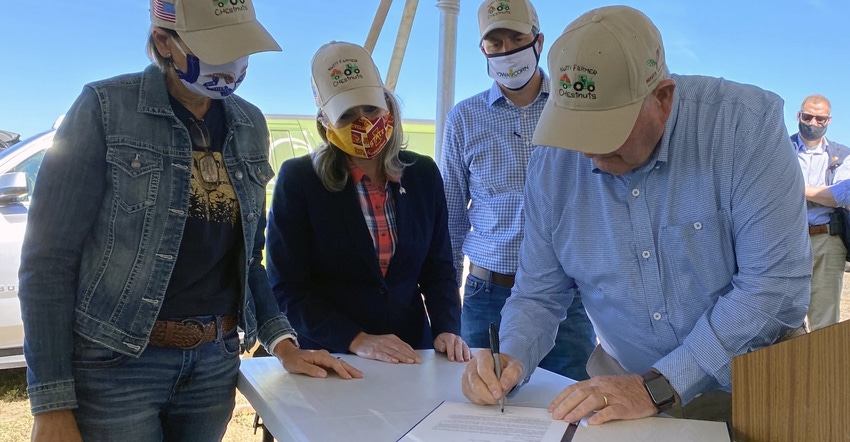Iowa farmers seek additional federal assistance beyond emergency loans following disaster.

U.S. Agriculture Secretary Sonny Perdue traveled to Iowa on Sept. 3 to see firsthand the damage caused by the hurricane-like derecho storm last month and the ongoing severe drought. During the visit, Perdue announced that 18 Iowa counties hit hardest by the derecho will be designated primary natural disaster areas.
“The extent of damage to crops, equipment, facilities and the ag sector as a whole from this storm is devastating,” Perdue said. “The recovery process is in full swing, and [the U.S. Department of Agriculture] is working diligently to expedite financial and technical support for Iowa farmers and livestock producers who have suffered unprecedented losses. We are standing by to expand this designation as we learn more about the full impacts of the Derecho.”
The designation for 18 Iowa counties as primary natural disaster areas enables producers who suffered losses because of the derecho that occurred on Aug. 10, 2020, to be eligible for emergency loans.
“These widespread weather impacts have caused our producers and their communities to experience unprecedented losses,” Iowa secretary of agriculture Mike Naig said. “We are thankful for the USDA’s partnership and Secretary Perdue’s disaster designation, which gives our producers access to federal loan and recovery resources.”
Naig noted that most Iowa farmers have multi-peril crop insurance coverage, which will help them recover a portion of the crop losses. “Farmers have invested a significant amount of time and financial resources in this year’s crop. It will be important for USDA and crop insurance providers to continue working with Iowa farmers as they assess the damage to their crops and potential harvest and grain quality implications,” he said.
The Iowa Corn Growers Assn. (ICGA) spoke directly with Perdue about assisting Iowa’s corn farmers due to the devasting drought and derecho that have an impact on a majority of the state. ICGA presented Perdue with several ideas for immediate financial relief that came from ICGA farmer members.
“Iowa corn farmers wish they didn’t have to request government assistance, as they’d rather have a crop to harvest and market access,” said ICGA president Carl Jardon, a farmer from Randolph, Iowa. “Unfortunately, that is not our reality this year, with natural disasters, trade disputes and a global pandemic on top of waiting to hear the outcome" of President Donald Trump saying he will speak with Environmental Protection Agency Administrator Andrew Wheeler about small refinery waivers. "Iowa’s farmers need immediate aid so they can begin to rebuild for next year,” he added.
In a letter to Perdue, Iowa’s corn farmers asked for the following actions:
Increase the indemnity on crop insurance for farmers either by granting a 100% coverage level or, at a minimum, an increase in the 10% coverage level from their chosen coverage level;
Have crop insurance premiums be due later in the year, such as in December instead of late September, which is the due date right now;
Make sure Coronavirus Food Assistance Program (CFAP) payments are issued for 2020 crop and that the 2020 crop is paid on base acres -- not harvested bushels -- due to so much corn being damaged by the derecho;
Allow CFAP payments to be issued retroactively to producers who marketed their grain late in the 2019 growing season;
Instruct the Risk Management Agency to issue guidance not requiring farmers to harvest downed corn to receive a payout;
Provide farmers with grain storage loans to assist in rebuilding the storage damaged by the derecho;
Allow livestock and biofuel producers to apply for assistance through USDA;
Ask Congress to work with the Small Business Administration to fix Paycheck Protection Program rules that will help farmers qualify for assistance by allowing gross revenue to be used in calculating qualifications for assistance, and
Ask the Administration to work with Congress to express the importance of including agricultural relief provisions in any relief package passed in the near future.
This Secretarial Derecho Disaster Declaration is in addition to the Secretarial Drought Disaster Declaration that was announced in August. The disaster declaration makes farm operators in primary and contiguous counties eligible for assistance programs provided by USDA's Farm Service Agency.
Producers in the Iowa counties of Benton, Boone, Cedar, Clinton, Dallas, Guthrie, Hamilton, Hardin, Jasper, Johnson, Jones, Linn, Marshall, Polk, Poweshiek, Scott, Story and Tama may be eligible to apply for emergency loans.
Producers in the contiguous counties listed here are also eligible to apply for emergency loans: Adair, Audubon, Black Hawk, Buchanan, Butler, Carroll, Cass, Delaware, Dubuque, Franklin, Greene, Grundy, Iowa, Jackson, Keokuk, Louisa, Madison, Mahaska, Marion, Muscatine, Warren, Washington, Webster and Wright counties in Iowa, as well as Carroll, Rock Island and Whiteside counties in Illinois.
The deadline to apply for these emergency loans is May 3, 2021.
About the Author(s)
You May Also Like




.png?width=300&auto=webp&quality=80&disable=upscale)
